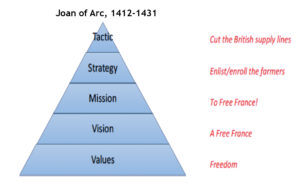Understanding Values, Vision and Mission In Family Business
 Many businesses write their vision and mission statement so they read similarly, just with different words. This shows a lack of understanding of these two important guiding business principles. They may also be missing a clear statement of their values; the bedrock upon which a sustainable business is built. Once clearly articulated a vision and mission statement can be crafted
Many businesses write their vision and mission statement so they read similarly, just with different words. This shows a lack of understanding of these two important guiding business principles. They may also be missing a clear statement of their values; the bedrock upon which a sustainable business is built. Once clearly articulated a vision and mission statement can be crafted
It’s important to make distinction between a vision and a mission. I hold that values are what’s fundamentally important — to an individual, a family, and as an extension, to their business. A vision is what the family aspires to build. Mission is a statement of how the family and the business will impact and share with the larger community. Together they clarify intention and facilitate trust within the family, leading to profitability and success across generations.
Remember Joan of Arc’s famous battle cry: “free France” (libérer la France). She states her mission as an action. The action is the fulfillment of her vision, “a free France.” Her driving value: freedom. Built on these, her strategy was to enroll the farmers. Her tactic, to cut the British supply lines. She succeeded because her mission was larger than herself.
One way to understand the larger purpose of your business’ mission is to ask yourself whether you would share it with your stakeholders (i.e. employees, client, customers, the public, etc.)
As an illustration: A bodega owner selling foods from his home country within his New York community stated his mission was to open two more stores. Asked if he would put that on the wall behind the check-out register, he demurred. He realized that more stores in and of themselves would not add value to his customers’ lives.
After considering the distinction he recognized that his mission, larger-than-himself, was to provide his New York community with the foods they remembered and enjoyed in their home country. In making the distinction he was enrolling his customers in his mission.
